Overview
This article presents ten effective strategies for hospital cost reduction that CFOs can implement to enhance financial performance while ensuring quality care. These strategies encompass:
- Leveraging technology
- Optimizing workforce management
- Establishing supplier partnerships
- Adopting value-based care models
Evidence supports their potential to streamline operations and minimize unnecessary expenses within healthcare settings. By integrating these approaches, healthcare leaders can not only improve their financial standing but also uphold the standards of care that patients deserve.
Introduction
In the ever-evolving landscape of healthcare, hospitals face the dual challenge of delivering high-quality patient care while simultaneously reducing operational costs. As financial pressures mount, the significance of strategic consulting becomes increasingly clear, offering a pathway to identify inefficiencies and implement effective cost-saving measures.
Moreover, healthcare organizations are leveraging technology solutions and optimizing workforce management, adopting innovative strategies that not only enhance financial performance but also improve patient engagement and outcomes.
This article delves into a comprehensive approach tailored for small and medium-sized hospitals, exploring various tactics—from value-based care models to strategic supplier partnerships—that can transform operations and secure sustainable financial health in an increasingly competitive environment.
Transform Your Small/ Medium Business: Comprehensive Consulting for Hospital Cost Reduction
Comprehensive consulting services play a pivotal role in assisting hospitals to identify inefficiencies and implement hospital cost reduction strategies. Through thorough monetary evaluations, including our Evaluation service, consultants pinpoint opportunities to conserve cash and implement hospital cost reduction strategies, ensuring that costs can be reduced without compromising the quality of care for individuals. This strategic approach incorporates hospital cost reduction strategies that streamline operations and significantly enhance the overall financial health of healthcare organizations.
As healthcare consumerism rises, a striking 75% of individuals prioritize digital engagement when selecting providers, underscoring the necessity for hospitals to adopt innovative strategies that enhance transparency and involvement. Furthermore, the shift toward personalized medicine and digital health solutions has amplified the demand for IT consulting services, highlighting the growing relevance of consulting in the healthcare sector.
For instance, consulting firms have successfully guided providers in implementing patient-friendly digital platforms, such as telehealth apps, to enhance patient engagement. For CFOs, leveraging these consulting services is crucial as they offer foundational hospital cost reduction strategies for achieving sustainable savings while upholding high standards of care.
Moreover, mastering the cash conversion cycle through thorough assessments that emphasize efficiency and risk reduction is vital for revealing value and implementing hospital cost reduction strategies. Factors such as aging populations and sophisticated analytics are fueling the demand for these services, while challenges like high implementation expenses and budget limitations emphasize the significance of consulting in addressing these matters.
Additionally, implementing the 20 hospital cost reduction strategies for Optimal Business Performance can further enhance operational efficiency and cost-effectiveness.
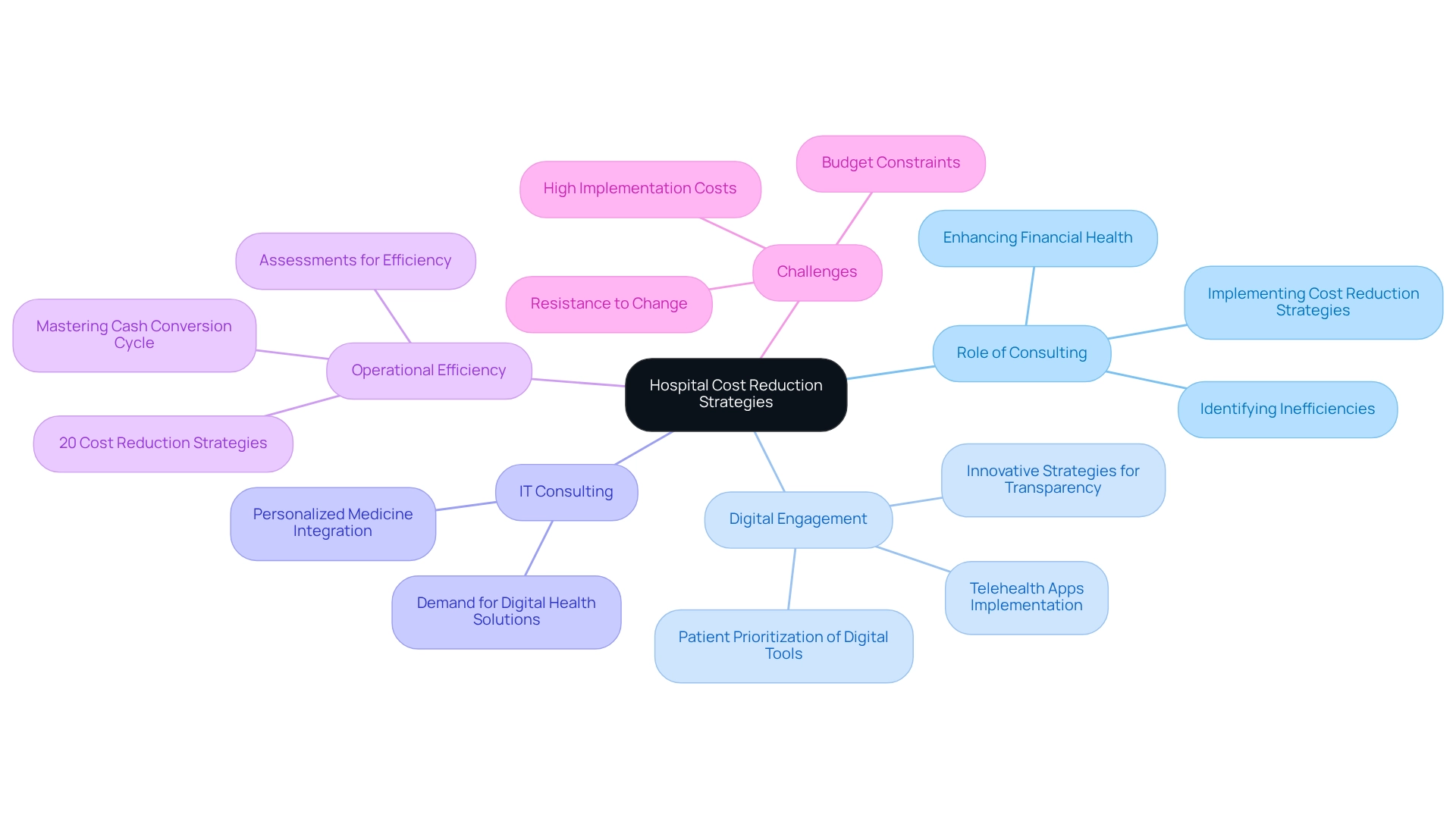
Implement Value-Based Care Models to Reduce Hospital Expenses
Shifting to value-based care models presents a strategic opportunity for hospitals to adopt hospital cost reduction strategies by aligning financial incentives with health outcomes. This model emphasizes preventive care and effective resource utilization as hospital cost reduction strategies, leading to substantial savings by minimizing readmissions and avoiding unnecessary procedures.
For instance, partnerships like Albany Med's collaboration with Honest Health exemplify how the adoption of value-based care strategies within Accountable Care Organizations (ACOs) can enhance health outcomes while also focusing on hospital cost reduction strategies. As hospitals increasingly embrace these models, they not only improve economic performance but also elevate client satisfaction.
In 2025, prioritizing value over volume will be essential for CFOs navigating the complexities of healthcare financing effectively. Furthermore, with Evernorth capping out-of-pocket costs for Zepbound and Wegovy at $200, CFOs gain valuable insights into managing patient expenses. Claire Rychlewski's perspective on the value of physicians further underscores the importance of aligning financial incentives with quality care.
Additionally, the OIG's report indicating that CMS is not tracking certain Medicaid managed care payments highlights the financial challenges healthcare organizations face. The bipartisan legislation aimed at simplifying Medicare Advantage prior authorization procedures also presents an opportunity for operational efficiency, which is crucial for effective hospital cost reduction strategies.
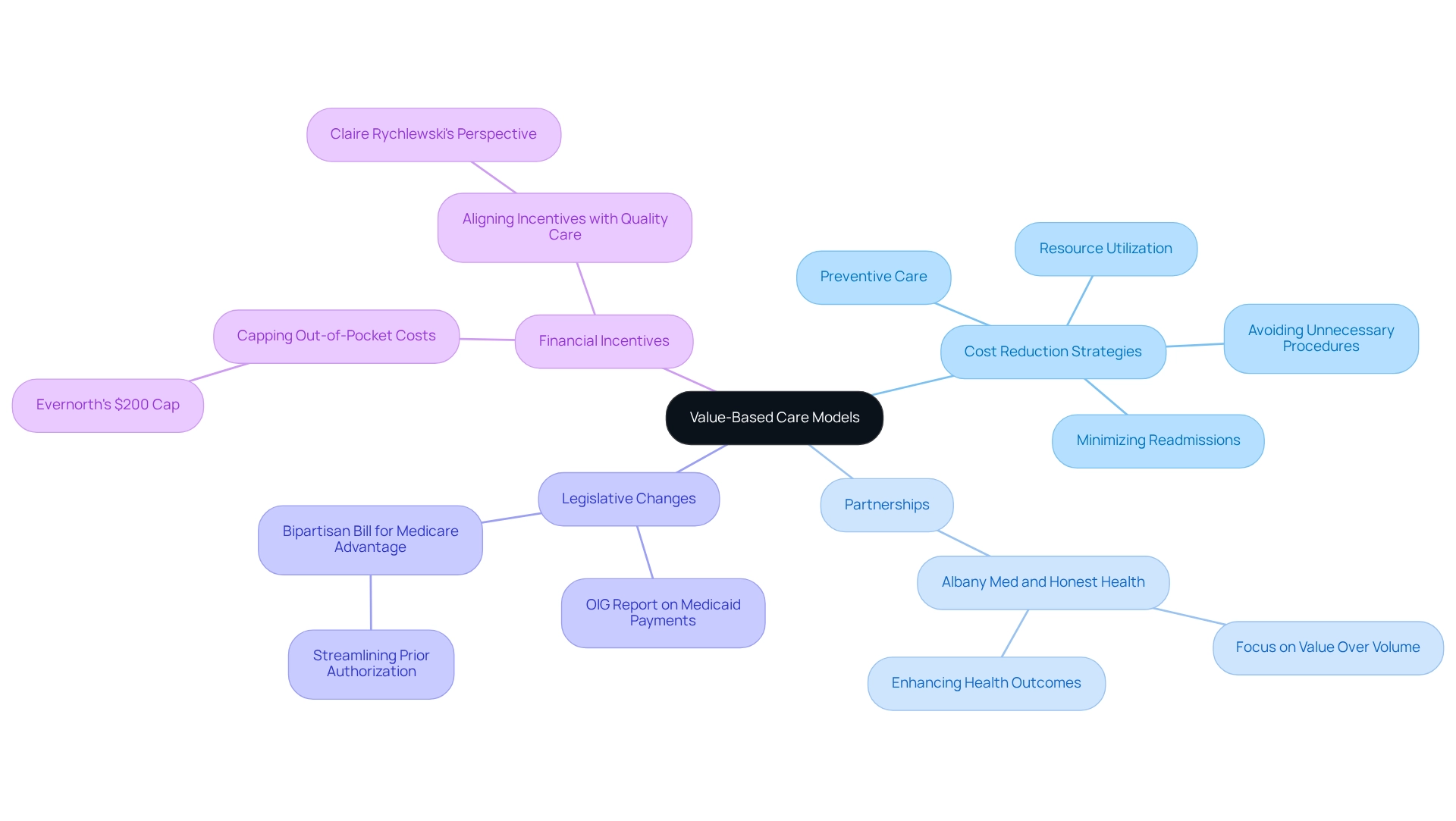
Leverage Technology Solutions for Operational Efficiency
Harnessing technology solutions such as electronic health records (EHRs), telehealth platforms, and automated scheduling systems is essential for improving operational efficiency in hospitals. These innovations alleviate administrative burdens and significantly reduce errors, thereby enhancing workflow and supporting hospital cost reduction strategies.
For instance, EHR systems have demonstrated their effectiveness in managing chronic illnesses by improving care coordination, which results in better health outcomes and lower long-term costs. Notably, teaching medical centers experience approximately 3% higher adverse incident rates compared to non-teaching facilities, underscoring the potential for technology to enhance patient safety and operational efficiency.
Furthermore, the implementation of EHRs is linked to significant hospital cost reduction strategies, enabling healthcare facilities to optimize resource allocation and minimize unnecessary expenses. Klara's software, recognized for its top estimated ROI in the small-business results index for HIPAA Compliant Messaging, exemplifies a technology solution that can yield substantial economic benefits.
As the recent European Union regulations on EHR systems emphasize the importance of data privacy, CFOs must prioritize investments in technology that not only align with operational objectives but also comply with evolving standards. By embracing these technological advancements, healthcare facilities can implement hospital cost reduction strategies to achieve greater efficiency and improve their financial performance.
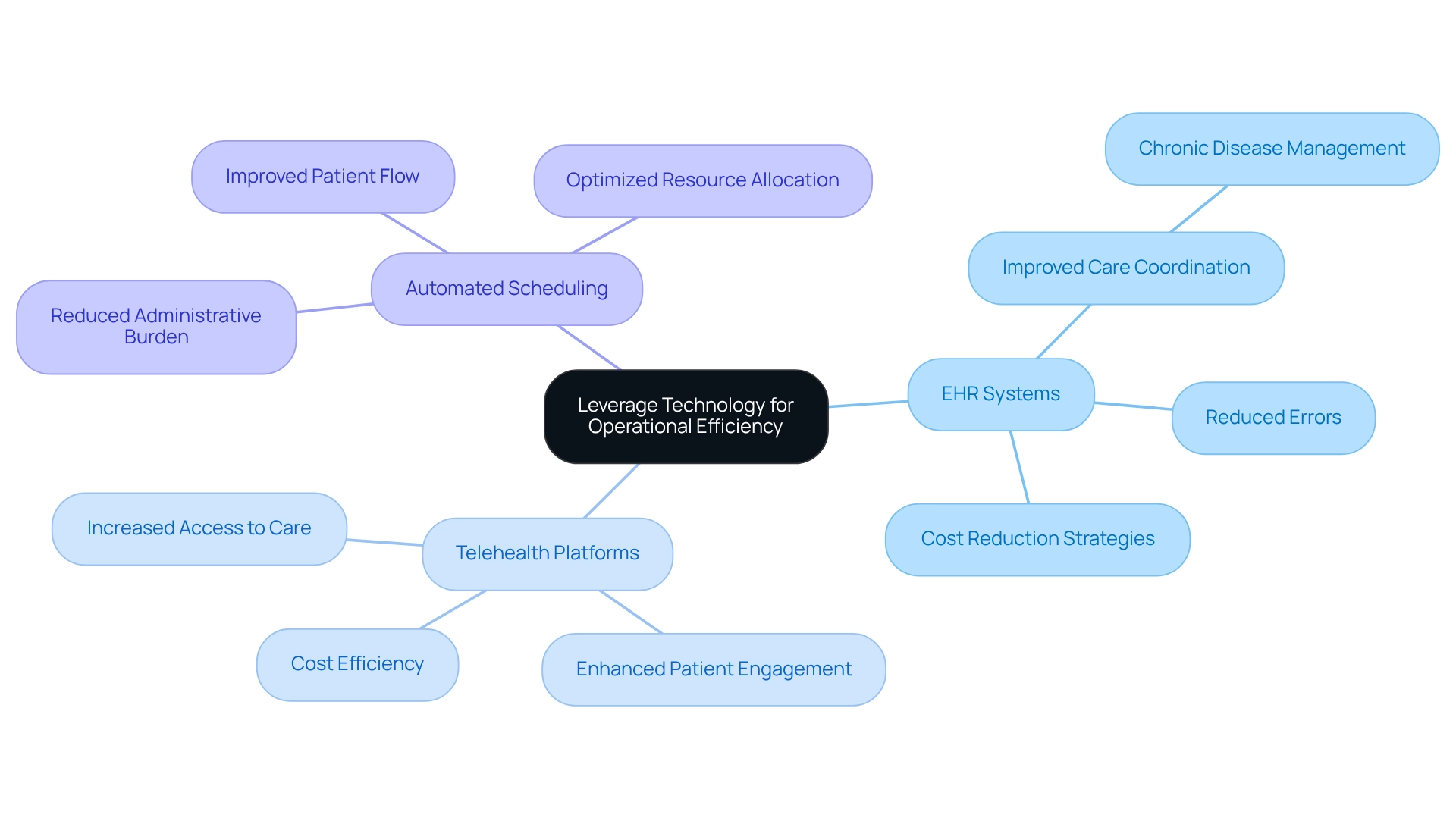
Establish Strategic Supplier Partnerships for Cost Savings
Forming strategic alliances with vendors is essential for healthcare facilities aiming to achieve significant savings. By negotiating favorable terms and utilizing bulk purchasing agreements, medical facilities can effectively lower their supply costs. For instance, Providence reported a $244 million operating loss in the first quarter, reflecting a -3.1% margin. This underscores the economic challenges hospitals face and the urgent need for effective hospital cost reduction strategies through partnerships with suppliers. A comprehensive monetary evaluation can reveal opportunities to preserve cash and reduce liabilities, laying a solid foundation for these partnerships.
The healthcare procurement transformation case study illustrates how implementing advanced procurement software, such as Tradogram, can streamline sourcing and supplier management. This results in reduced purchase order processing times and enhanced spend visibility, allowing healthcare organizations to concentrate more on patient care. CFOs should prioritize cultivating long-term relationships with key suppliers to ensure consistent quality and pricing, ultimately strengthening financial stability. Current trends indicate that medical facilities implementing hospital cost reduction strategies through strategic supplier partnerships can achieve substantial savings, with some organizations reporting notable improvements in their margins.
Setting key performance indicators (KPIs) such as delivery times and stock-outs is crucial for evaluating supplier performance over time. This ensures that healthcare facilities can continuously optimize their supply chain management. As Coach Allison Dunn states, "Businesses like yours can achieve remarkable growth through strategic partnerships," reinforcing the financial benefits of these collaborations.

Optimize Workforce Management to Enhance Productivity
Improving workforce management is essential for medical facilities aiming to enhance productivity and control expenses. This necessitates a thorough evaluation of staffing needs and the strategic adjustment of schedules to align with client demand. By implementing data-driven scheduling practices, healthcare facilities can adopt hospital cost reduction strategies to significantly lower labor costs while improving service delivery.
A well-balanced workforce management strategy that integrates individual, staff, and operational data has been shown to yield better results across clinical, financial, and operational metrics. A Senior Vice President and System Nurse Executive at a health system in the Carolinas noted, "If one hospital had three or four critical care nurses out sick, they may desperately need critical care nurses, even spending huge dollars in premium labor and staffing incentives to get those shifts covered when, ten miles down the road, we might be sending people home because we didn’t have enough patients." This underscores the urgent need for effective workforce management.
Furthermore, cross-training staff not only enhances flexibility but also ensures that critical roles are filled without incurring excessive overtime costs. As healthcare organizations face evolving demands, particularly with the long-term care center sector expected to experience the fastest growth, CFOs must prioritize workforce optimization as a vital strategy for achieving operational efficiency and implementing hospital cost reduction strategies to ensure sustainable financial health.
The case study titled "Balanced Workforce Management Strategies" demonstrates that a comprehensive workforce management approach can lead to improved outcomes across all key areas.
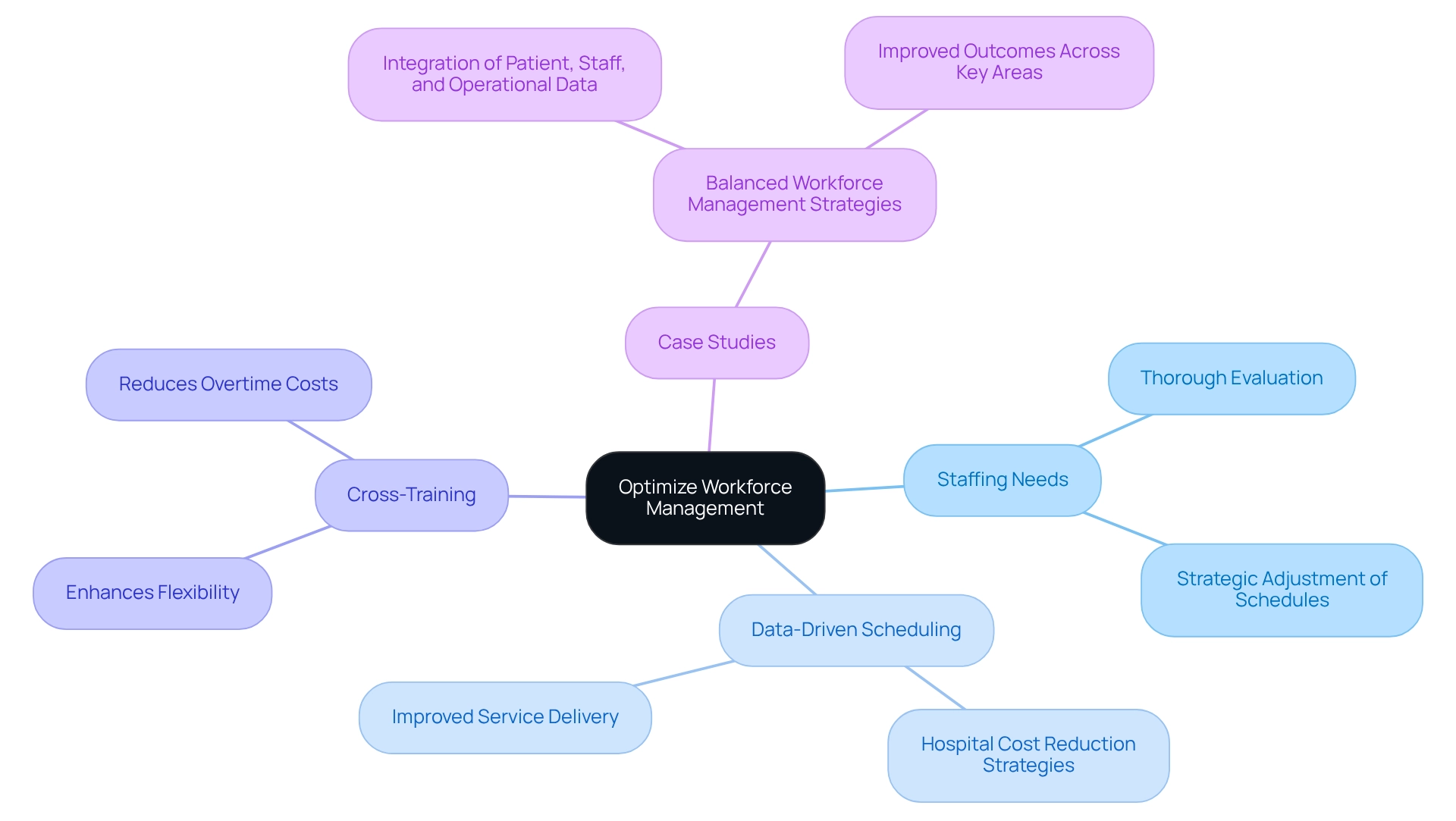
Conduct Financial Assessments to Identify Cost-Saving Opportunities
Conduct Financial Assessments to Identify Cost-Saving Opportunities
Regular financial assessments are vital for hospitals aiming to uncover inefficiencies and identify potential savings. By carefully examining expenses, revenue sources, and operational costs, CFOs can develop focused hospital cost reduction strategies that minimize waste and enhance economic performance. Specific strategies for mastering the cash conversion cycle include:
- Optimizing inventory management
- Improving billing processes
- Accelerating receivables collection
This proactive strategy not only helps in sustaining a viable economic model but also enables healthcare facilities to react efficiently to ongoing monetary challenges.
Research shows that medical facilities frequently encounter considerable economic inefficiencies, as numerous organizations overlook major cost-saving chances due to inadequate comprehensive fiscal assessments, highlighting the importance of hospital cost reduction strategies. Significantly, individuals admitted for psychiatric reasons and substance use were excluded from the study, emphasizing the variability in populations and its effect on economic evaluations. Expert opinions underscore the necessity of these assessments, with John W. Beard from GE HealthCare stating, "Our estimates for cost-savings may also vary according to the patient population treated at a respective hospital." This insight highlights the complexities involved in monetary evaluations.
Moreover, the incorporation of real-time analytics—like dashboards that offer ongoing performance monitoring—can greatly improve the efficiency of evaluations, enabling CFOs to make informed decisions quickly. The urgent requirement for legislative backing, as detailed in the case study titled 'Need for Congressional Support for Healthcare Facilities,' highlights the wider monetary obstacles these institutions encounter, emphasizing the significance of economic evaluations. As the healthcare landscape evolves, the importance of financial assessments in identifying hospital cost reduction strategies remains paramount for CFOs looking to secure their organizations' financial health in 2025 and beyond.
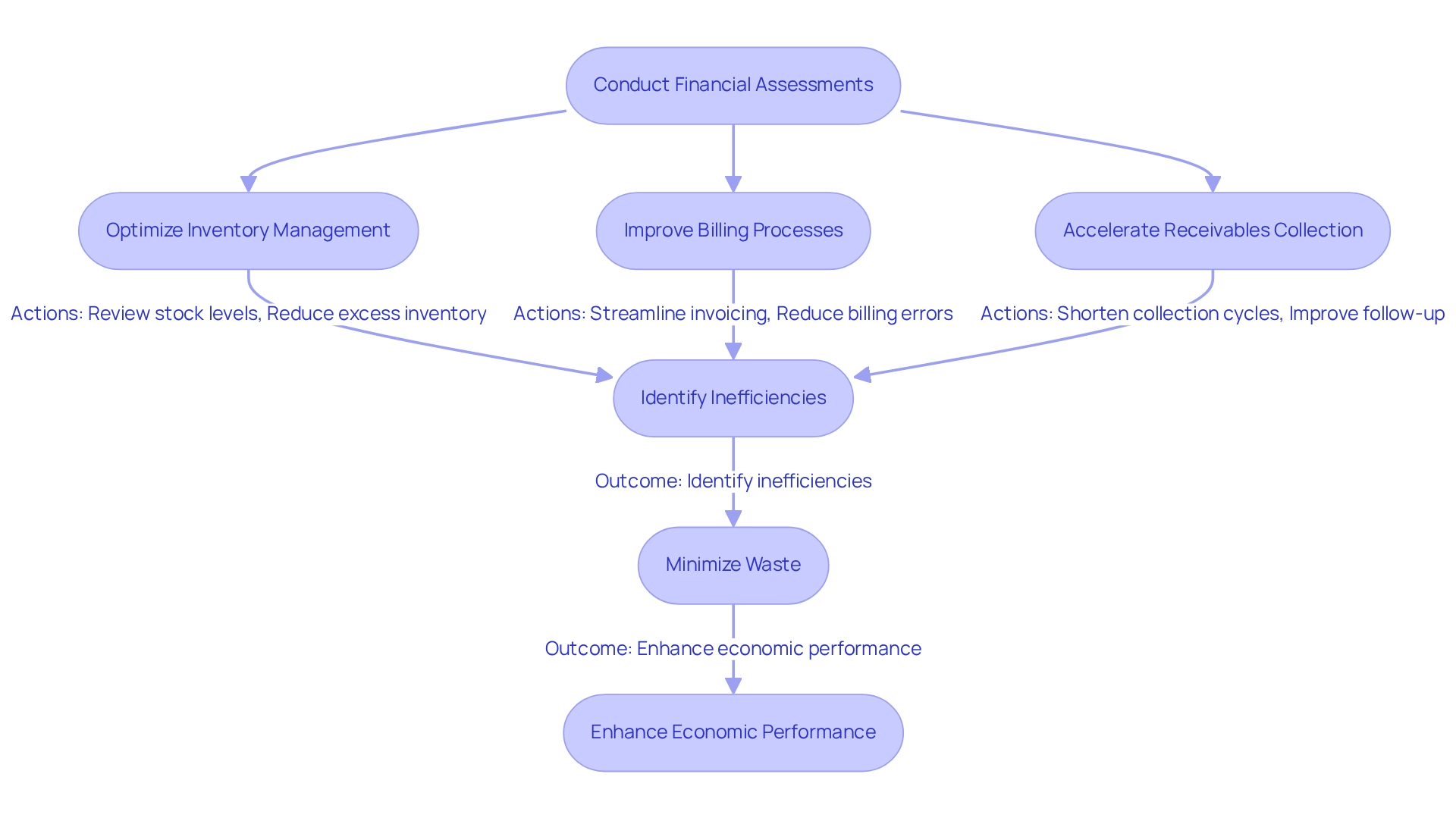
Utilize Telehealth Services to Cut Operational Costs
Implementing telehealth services can significantly reduce operational costs for medical facilities by minimizing the need for physical space and in-person staffing. By utilizing telehealth, healthcare providers can improve access to care for individuals while streamlining operations, allowing them to serve a larger group more efficiently. As telehealth adoption continues to rise in 2025, healthcare facilities can anticipate enhanced financial performance alongside increased satisfaction among individuals receiving care.
A focus group of national telehealth and economics specialists identified crucial areas where telehealth could lead to significant savings, highlighting its potential as a key component of hospital cost reduction strategies. Furthermore, research suggests that telehealth services can result in savings of up to 59 AUD per individual, particularly from a study on videoconference speech therapy for rural individuals, showcasing its effectiveness in preserving quality of care while reducing expenses.
As Krupal B. Patel, MD, MSc, observed, "Future studies should investigate other savings, such as those for cancer caregivers and how these differ for rural and urban patients with cancer." Therefore, CFOs should prioritize the integration of telehealth into their service offerings to capitalize on these benefits and drive sustainable growth.
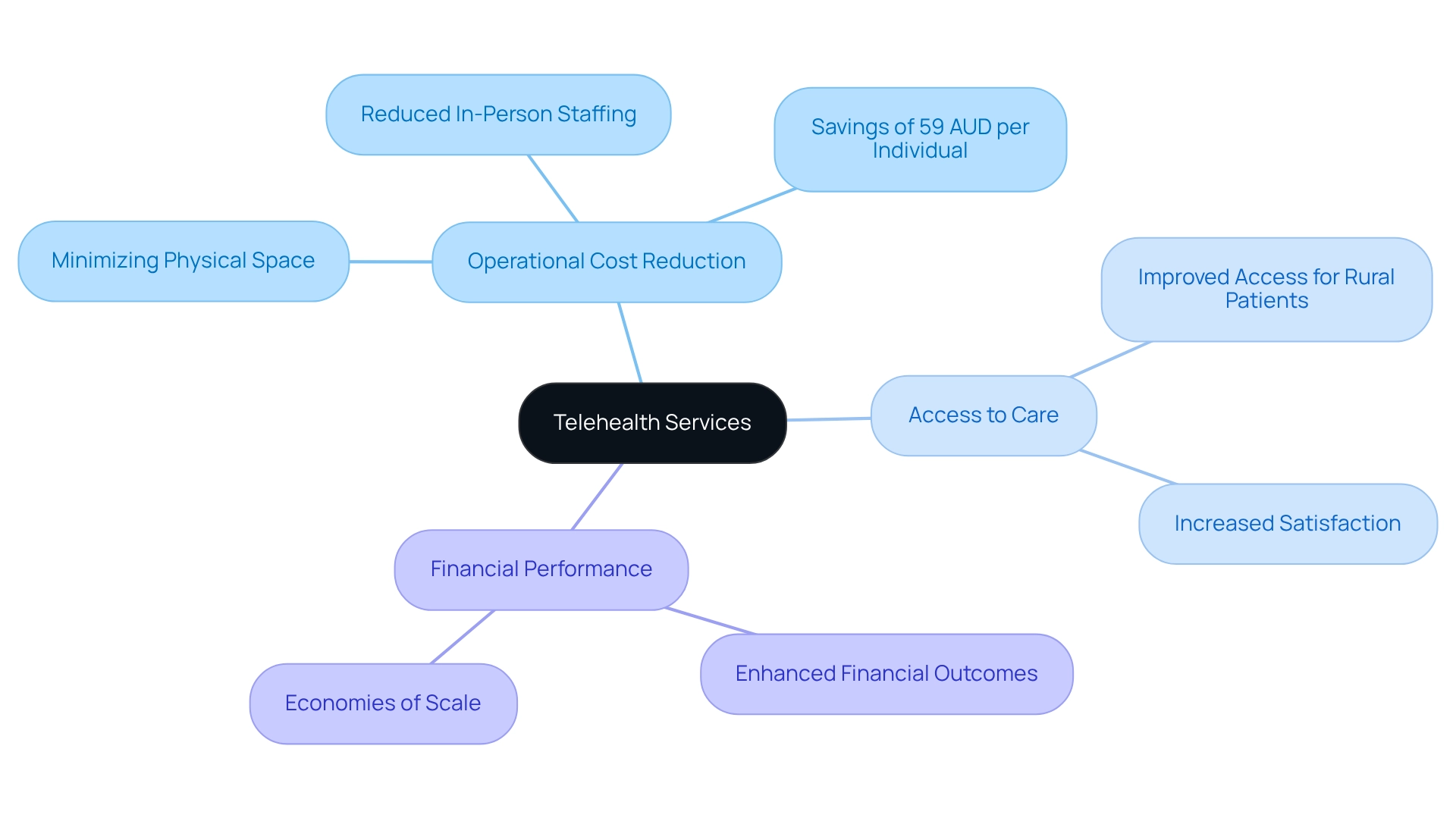
Adopt Supply Chain Management Best Practices for Efficiency
Implementing hospital cost reduction strategies through best practices in supply chain management is crucial for enhancing efficiency and driving down costs in healthcare organizations. By streamlining procurement processes, optimizing inventory levels, and leveraging data analytics, hospitals can significantly reduce waste and ensure the availability of essential supplies. For instance, improved forecasting can lead to fewer rush orders and minimize the risk of expired supplies, ultimately enhancing operational efficiency. The healthcare sector stands to gain a staggering $25.4 billion from supply chain optimization, underscoring the financial benefits of these strategies. Experts emphasize that hospital cost reduction strategies are supported by a well-managed supply chain that not only improves efficiency but also reduces costs and minimizes variation and waste.
A case study on enhancing order precision highlights the vital role of accurate ordering in sustaining supply chain efficiency and overall operations. Incorrect ordering can adversely affect service delivery and margins, making it crucial for medical facilities to improve order accuracy to avoid supply shortages and enhance lead times, resulting in better experiences for individuals and stronger financial results. As organizations like HPH demonstrate, replicating supply chain improvements across various procedural areas, including endoscopy and the cath lab, can yield substantial benefits. Therefore, CFOs should prioritize supply chain optimization as a fundamental aspect of their hospital cost reduction strategies.
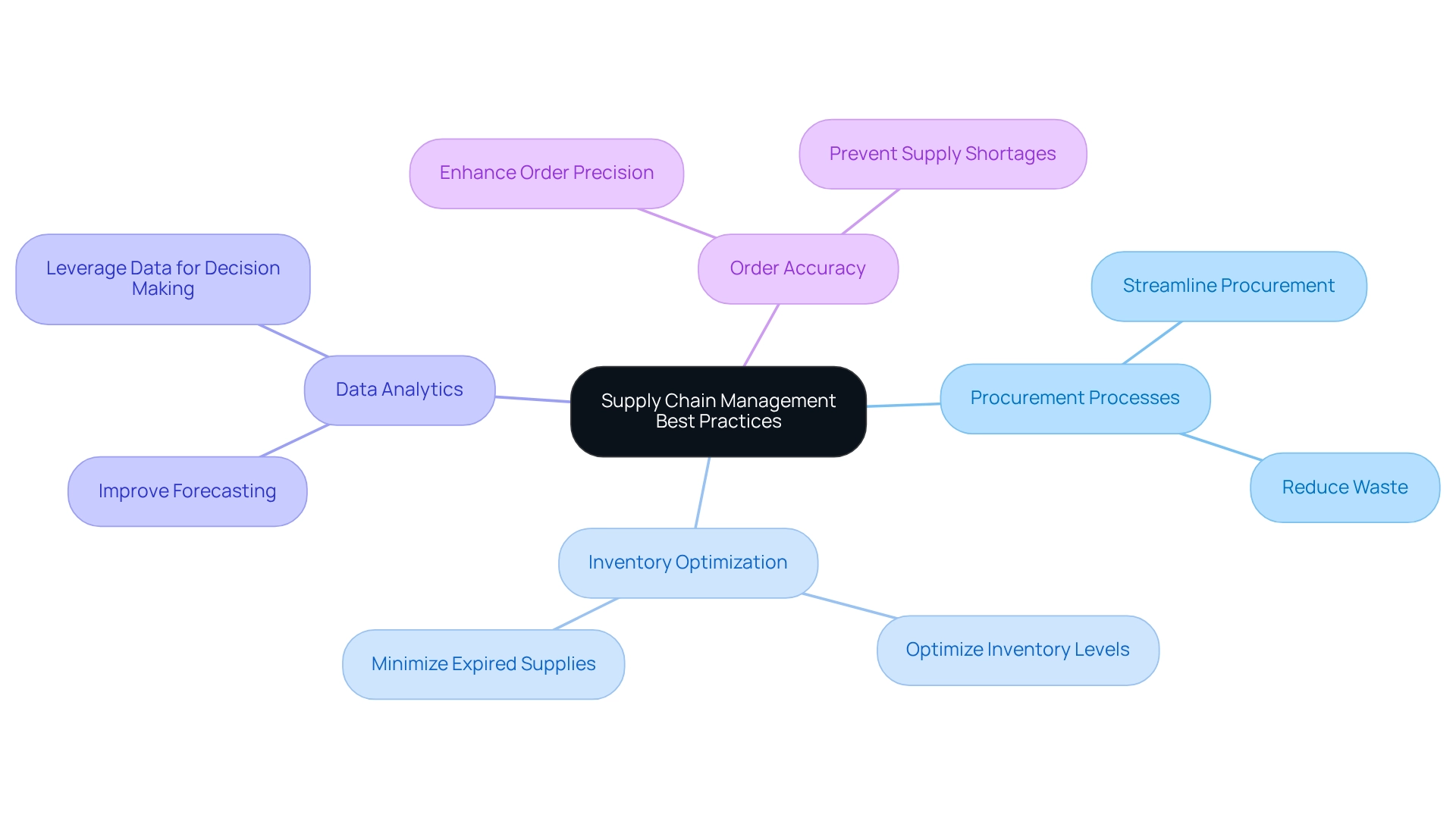
Enhance Patient Engagement to Lower Readmission Costs
Improving participant engagement is crucial for lowering readmission expenses in hospitals. By adopting strategies that encourage active participant involvement—such as follow-up calls and educational resources—healthcare organizations can significantly enhance adherence to treatment plans.
Studies indicate that 63% of individuals over 55 believe that prompt responses to follow-up questions are vital for their satisfaction, which directly correlates with their willingness to engage in their care. Moreover, open dialogue between individuals receiving care and healthcare providers promotes a collaborative atmosphere, enabling the enhancement of care plans based on feedback from those individuals.
This proactive approach not only leads to early detection of potential health issues but also enhances overall treatment effectiveness. As Francis Peabody stated, "True healing goes beyond medical treatment; it involves genuinely caring for the individual's well-being."
CFOs should prioritize investments in client engagement initiatives, as these efforts not only enhance outcomes but also contribute to hospital cost reduction strategies by positively influencing the hospital's financial performance through a decrease in unnecessary readmissions.
Implementing QR code-activated surveys can facilitate easy feedback collection, further driving participant involvement and adherence to care protocols. In addition, utilizing advanced EHR solutions like those offered by Intelligent Medical Software (IMS) can enhance patient engagement through features such as patient portals and telemedicine.
By concentrating on hospital cost reduction strategies, medical facilities can achieve lasting savings while enhancing the quality of care.
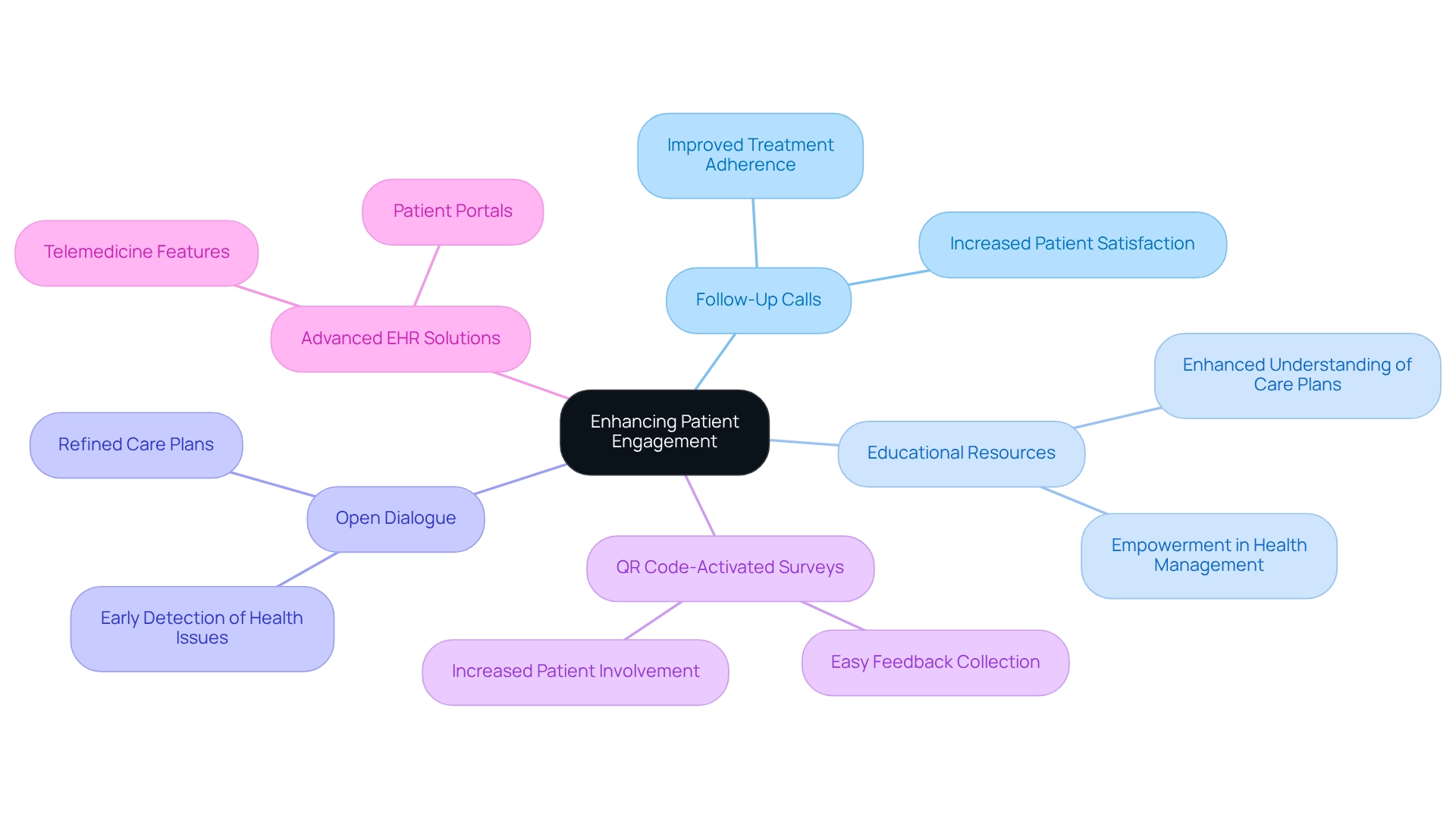
Implement Continuous Improvement Initiatives for Sustainable Cost Reduction
Implementing continuous improvement initiatives is essential for achieving hospital cost reduction strategies. By cultivating a culture of innovation and efficiency, healthcare organizations can continuously evaluate and enhance their processes, which can lead to effective hospital cost reduction strategies and improved operational performance.
For instance, recent continuous quality improvement (CQI) efforts have demonstrated a marked reduction in in-hospital deaths and improved survival rates. This is evidenced by the case study titled "CQI and Morbidity/Mortality Outcomes," which highlighted significant improvements in management outcomes for individuals with chronic conditions.
CFOs should prioritize hospital cost reduction strategies as a strategic imperative; it not only fosters a resilient organizational culture but also drives long-term financial health. As Yibeltal Assefa from the School of Public Health at The University of Queensland states, "Continuous improvement is vital for healthcare organizations to adapt and thrive in a rapidly changing environment."
Embracing this approach allows hospitals to adapt to changing healthcare landscapes while maintaining cost efficiency through hospital cost reduction strategies and enhancing patient care.
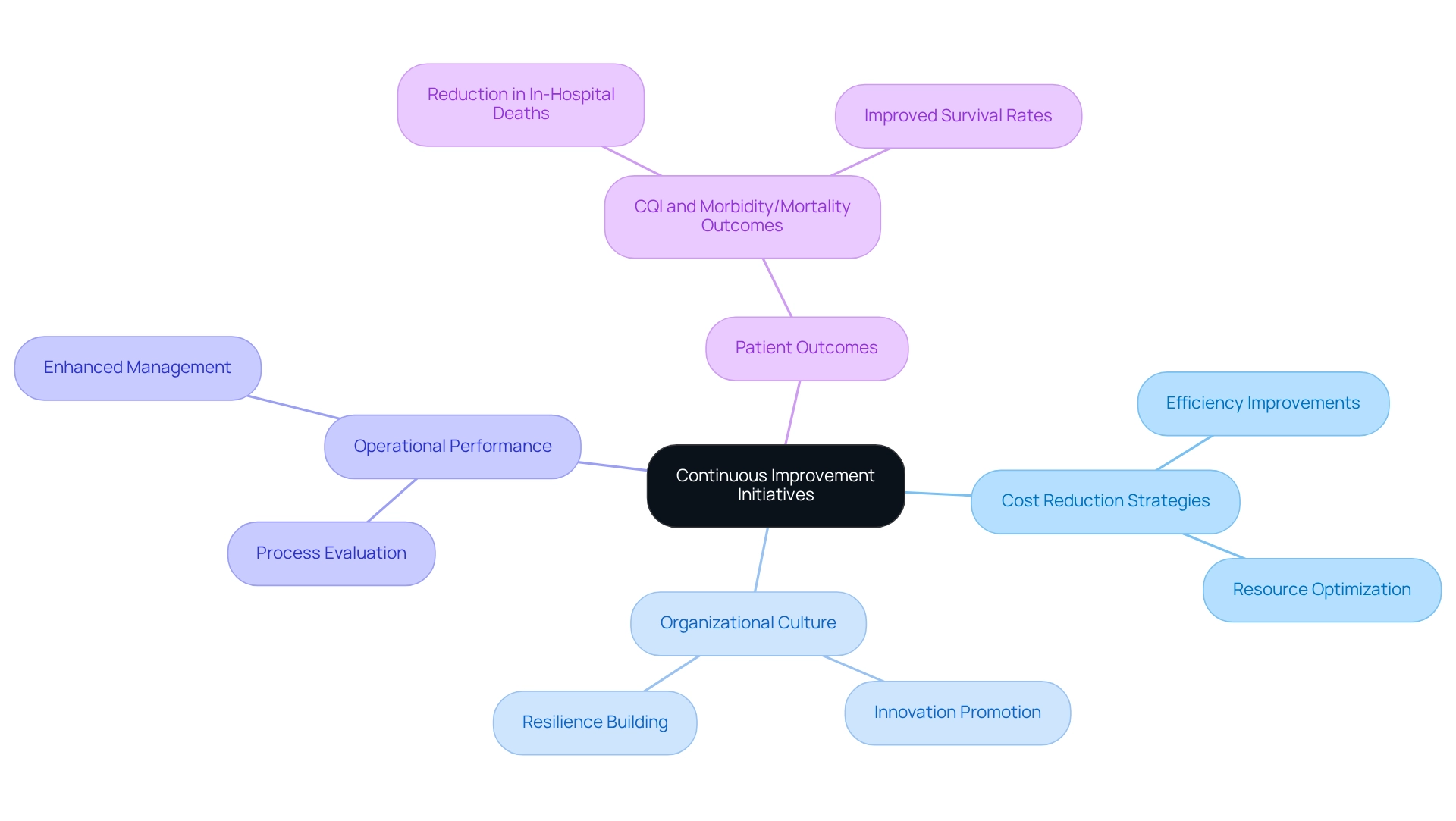
Conclusion
The healthcare landscape is undergoing significant transformation, compelling small to medium-sized hospitals to adapt in order to remain financially viable while delivering high-quality patient care. By leveraging comprehensive consulting services, hospitals can identify inefficiencies and implement strategic cost-saving measures that enhance operational performance. Transitioning to value-based care models and adopting innovative technology solutions further positions hospitals to optimize resources, improve patient engagement, and ultimately drive financial sustainability.
Establishing strategic supplier partnerships and optimizing workforce management are equally vital for reducing operational costs. By streamlining procurement processes and employing data-driven staffing strategies, hospitals can enhance productivity without sacrificing care quality. Conducting regular financial assessments plays a critical role in uncovering additional cost-saving opportunities, allowing CFOs to make informed decisions that align with the financial health of their organizations.
Moreover, the integration of telehealth services and best practices in supply chain management can lead to substantial operational efficiencies. Enhancing patient engagement initiatives not only lowers readmission rates but also fosters a culture of collaboration that is essential for effective care delivery. Finally, embracing continuous improvement initiatives cultivates an innovative environment that is responsive to the dynamic challenges of healthcare.
In conclusion, the path to sustainable financial health for hospitals is multifaceted, requiring a strategic approach that encompasses various operational aspects. By prioritizing these comprehensive strategies, healthcare organizations can navigate the complexities of today’s environment, ensuring they thrive while delivering exceptional patient care. The imperative for CFOs and hospital administrators is clear: investing in a holistic, forward-thinking strategy will yield significant returns, securing both financial stability and improved patient outcomes in the long run.
Frequently Asked Questions
What role do comprehensive consulting services play in hospitals?
Comprehensive consulting services help hospitals identify inefficiencies and implement cost reduction strategies, ensuring costs are reduced without compromising the quality of care.
How do consultants assist in hospital cost reduction?
Consultants conduct thorough monetary evaluations to pinpoint opportunities for cash conservation and streamline operations, enhancing the overall financial health of healthcare organizations.
Why is digital engagement important for hospitals?
With 75% of individuals prioritizing digital engagement when selecting healthcare providers, hospitals need to adopt innovative strategies that enhance transparency and patient involvement.
What is the significance of IT consulting services in healthcare?
The demand for IT consulting services has increased due to the shift towards personalized medicine and digital health solutions, which help hospitals implement patient-friendly platforms like telehealth apps.
How can CFOs benefit from consulting services?
CFOs can leverage consulting services to achieve sustainable savings and uphold high standards of care through foundational hospital cost reduction strategies.
What is the cash conversion cycle, and why is it important?
Mastering the cash conversion cycle through thorough assessments emphasizes efficiency and risk reduction, revealing value and aiding in hospital cost reduction strategies.
What are some challenges hospitals face in implementing cost reduction strategies?
High implementation expenses and budget limitations are significant challenges that highlight the need for consulting services in addressing these issues.
What is the value-based care model?
The value-based care model aligns financial incentives with health outcomes, emphasizing preventive care and effective resource utilization to minimize readmissions and unnecessary procedures.
How can partnerships enhance hospital cost reduction strategies?
Collaborations, such as Albany Med's partnership with Honest Health, demonstrate how adopting value-based care strategies can improve health outcomes while focusing on cost reduction.
What technological solutions are essential for operational efficiency in hospitals?
Electronic health records (EHRs), telehealth platforms, and automated scheduling systems are crucial for improving operational efficiency, reducing administrative burdens, and minimizing errors.
How do EHR systems contribute to hospital cost reduction?
EHR systems improve care coordination, leading to better health outcomes and lower long-term costs, thus supporting hospital cost reduction strategies.
What compliance considerations should CFOs keep in mind regarding technology investments?
CFOs must prioritize technology investments that align with operational objectives and comply with evolving data privacy regulations, such as those from the European Union.




